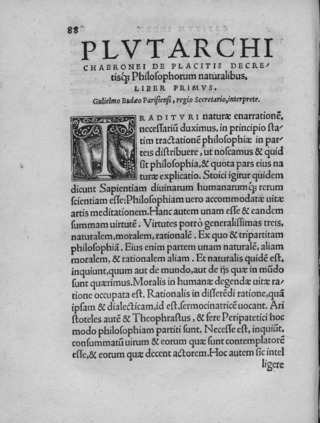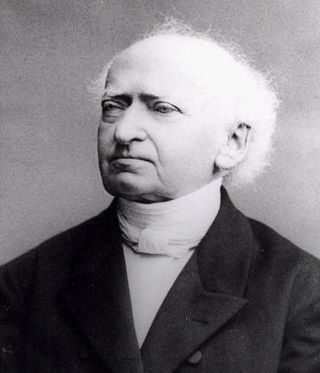Plutarch was a Greek Middle Platonist philosopher, historian, biographer, essayist, and priest at the Temple of Apollo in Delphi. He is known primarily for his Parallel Lives, a series of biographies of illustrious Greeks and Romans, and Moralia, a collection of essays and speeches. Upon becoming a Roman citizen, he was possibly named Lucius Mestrius Plutarchus.

Pope Gregory I, commonly known as Saint Gregory the Great, was the 64th Bishop of Rome from 3 September 590 to his death. He is known for instituting the first recorded large-scale mission from Rome, the Gregorian mission, to convert the then largely pagan Anglo-Saxons to Christianity. Gregory is also well known for his writings, which were more prolific than those of any of his predecessors as pope. The epithet Saint Gregory the Dialogist has been attached to him in Eastern Christianity because of his Dialogues. English translations of Eastern texts sometimes list him as Gregory "Dialogos" from the Greek διάλογος, or the Anglo-Latinate equivalent "Dialogus". He is the second of the three Popes listed in the Annuario Pontificio with the title "the Great", alongside Popes Leo I and Nicholas I.
Alcippe was a name attributed to a number of figures in Greek mythology.

Amphiaraus or Amphiaraos was in Greek mythology the son of Oicles, a seer, and one of the leaders of the Seven against Thebes. Amphiaraus at first refused to go with Adrastus on this expedition against Thebes as he foresaw the death of everyone who joined the expedition. His wife, Eriphyle, eventually compelled him to go.

In Greek mythology, Laertes was the king of the Cephallenians, an ethnic group who lived both on the Ionian Islands and on the mainland. He presumably inherited the kingdom from his father Arcesius and grandfather Cephalus. His realm included Ithaca and surrounding islands, and perhaps even the neighboring part of the mainland of other Greek city-states. Laertes was also an Argonaut, and a participant in the hunt for the Calydonian Boar.

In Greek mythology, Anticlea or Anticlia was a queen of Ithaca as the wife of King Laërtes.
Bartholomaeus Anglicus, also known as Bartholomew the Englishman and Berthelet, was an early 13th-century Scholastic of Paris, a member of the Franciscan order. He was the author of the compendium De proprietatibus rerum, dated c.1240, an early forerunner of the encyclopedia and a widely cited book in the Middle Ages. Bartholomew also held senior positions within the church and was appointed Bishop of Łuków in what is now Poland, although he was not consecrated to that position.
This article presents lists of the literary events and publications in 1603.

Philemon Holland was an English schoolmaster, physician and translator. He is known for the first English translations of several works by Livy, Pliny the Elder, and Plutarch, and also for translating William Camden's Britannia into English.

The Moralia is a group of manuscripts written in Ancient Greek dating from the 10th–13th centuries but traditionally ascribed to the 1st-century scholar Plutarch of Chaeronea. The eclectic collection contains 78 essays and transcribed speeches. They provide insights into Roman and Greek life, but they also include timeless observations. Many generations of Europeans have read or imitated them, including Michel de Montaigne, Renaissance Humanists and Enlightenment philosophers.

Franz Delitzsch was a German Lutheran theologian and Hebraist. Delitzsch wrote many commentaries on books of the Bible, Jewish antiquities, Biblical psychology, as well as a history of Jewish poetry, and works of Christian apologetics. Today, Delitzsch is best known for his translation of the New Testament into Hebrew (1877), and his series of commentaries on the Old Testament published with Carl Friedrich Keil.

In Greek mythology, Nilus is one of the three thousand Potamoi, the river gods, who represent the god of the Nile river itself. Nilus is the son of the water gods Oceanus and Tethys.

In Greek mythology, Lycaon was a king of Arcadia who, in the most popular version of the myth, killed and cooked his son Nyctimus and served him to Zeus, to see whether the god was sufficiently all-knowing to recognize human flesh. Disgusted, Zeus transformed Lycaon into a wolf, while Nyctimus was restored to life.

Cornelius Cornelii a Lapide was a Flemish Catholic priest. He was a Jesuit and exegete of Sacred Scripture.
Astynome is a name which may refer to one of the following characters in Greek mythology:

The Moralia in Job of 945 is an illuminated manuscript of 502 bound folios, containing the text of the Commentary on Job by Gregory the Great. A colophon on the verso of its folio 500 shows its copying and illumination was completed on 11 April 945 by one Florentius in the monastery of Valeránica in what is now the town of Tordómar in Spain. Florentius is also known as the artist and copyist of other important Spanish manuscripts of this era, including the León Bible of 960.

In Greek mythology, Marpessa was an Aetolian princess and a granddaughter of Ares.
In Greek mythology, Evenus a river-god of Aetolia as the son of the Titans Oceanus and Tethys.
In Greek mythology, Boeotus was the eponym of Boeotia in Greece. Poseidon fathered both Aeolus and Boeotus with Arne (Melanippe). It was then through Boeotus that Arne became the ancestress of the Boeotians. In some traditions, Boeotus is the father of Ogyges.
There have been many commentaries on the biblical Book of Job.












